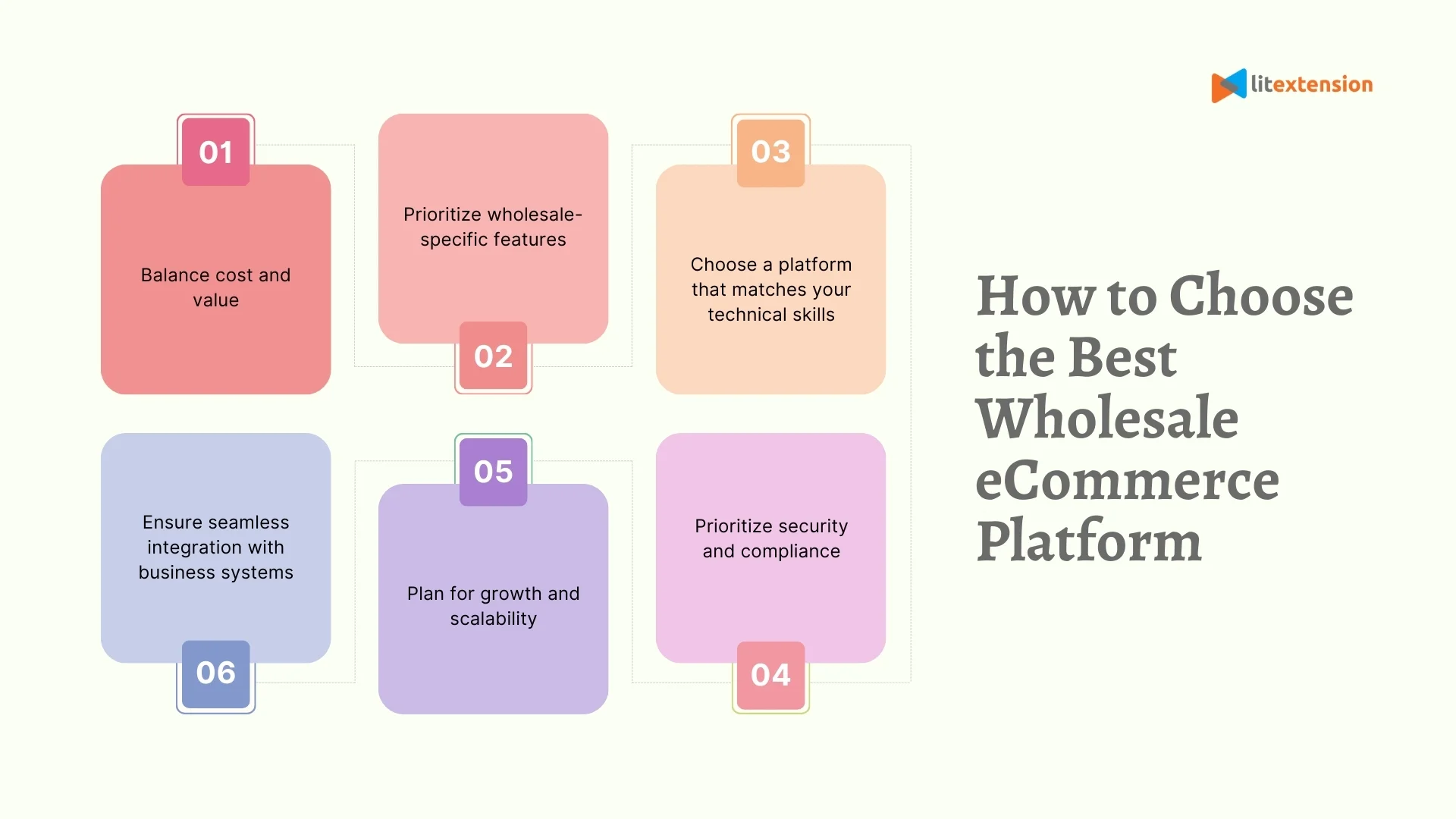Unlike traditional retail, wholesale eCommerce focuses on large orders, tiered pricing, and customer-specific discounts. To manage these complexities, businesses need the best wholesale eCommerce platform that comes with specific features to support them along the way.
And that's what inspired us to craft this article to help you select the best options for your online store. In this article, we will explore the best wholesale eCommerce platform for your consideration, including:
- #1. Shopify Plus
- #2. BigCommerce Enterprise
- #3. Adobe Commerce
- #4. WooCommerce
- #5. Oracle Commerce
- #6. Virto Commerce
- #7. OroCommerce
- #8. WizCommerce
- #9. BetterCommerce
- #10. Experlogix
Without further delay, let's get started!
10 Best Wholesale eCommerce Platforms for Your Consideration
In this section, we will explore the seven best wholesale eCommerce platforms, comparing their features, pricing, and benefits. Whether you're a manufacturer, distributor, or retailer expanding into wholesale, this guide will help you find the best fit.
#1 Shopify Plus
User reviews: 4.8/5 on Capterra | 4.4/5 on G2
Leading in our list of the best wholesale eCommerce platform is Shopify Plus – the enterprise version of Shopify. It is designed for high-volume businesses, including wholesalers and B2B merchants. It offers advanced features, automation tools, and customization options that cater to businesses needing a scalable and efficient wholesale eCommerce platform.
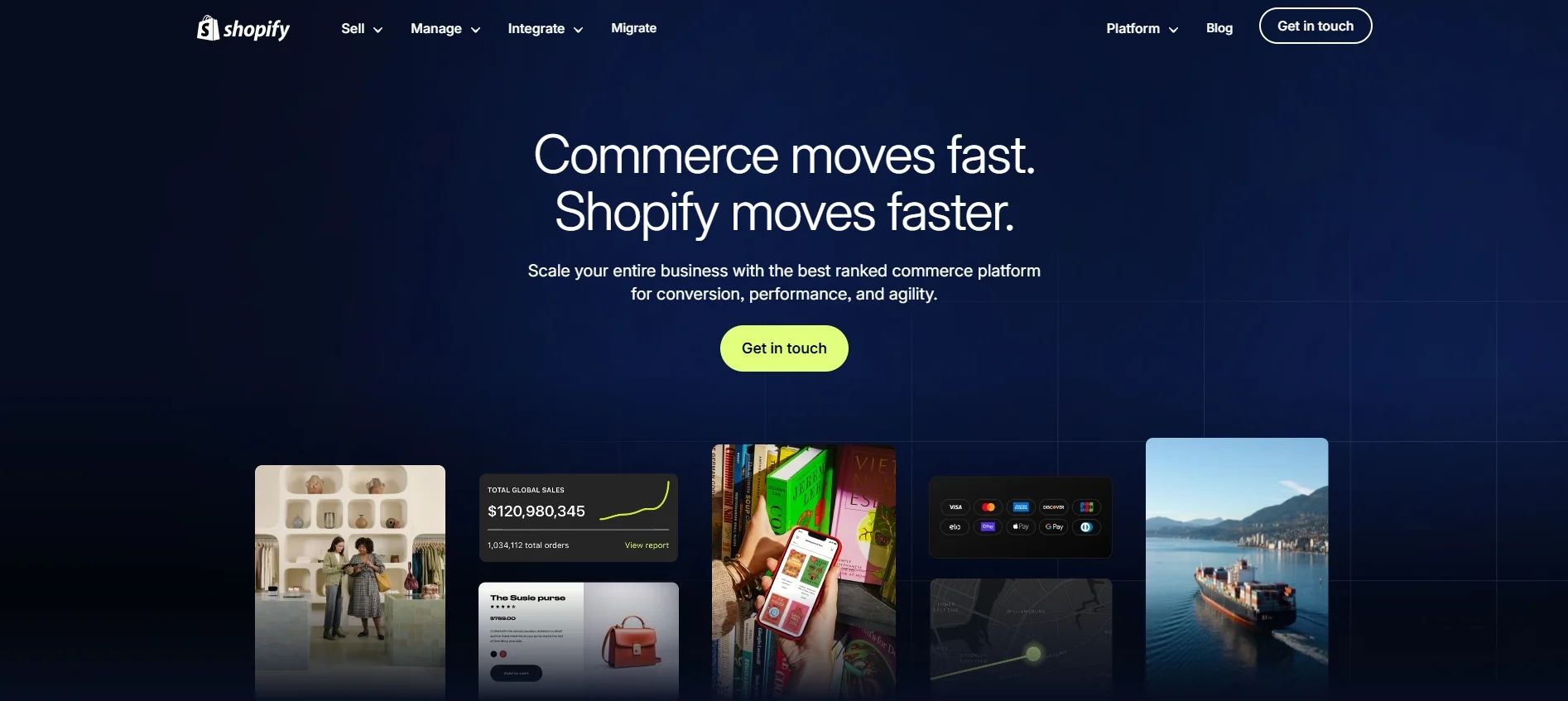
With a user-friendly interface and powerful integrations, Shopify Plus allows businesses to streamline bulk ordering, offer custom pricing, and manage high-order volumes with ease.
Below is the breakdown of the pros and cons of Shopify Plus for your consideration.
Shopify Plus Pros | Shopify Plus Cons |
✓ Supports tiered pricing, volume discounts, and customer-specific pricing to cater to different buyer groups. | – Starts at $2,500 per month, which can be considered a high cost for smaller wholesalers. |
✓ Offers script editing and API access to customize the checkout experience for wholesale buyers. | – Has limited customization options at the backend unless you have advanced technical skills. |
✓ Creates wholesale customer accounts, custom pricing, and bulk ordering options within the same storefront. | |
✓ Automates tasks like order approvals, customer segmentation, and personalized discounts with Shopify Flow. | |
✓ Provides real-time insights into sales, customer behavior, and inventory trends to optimize wholesale operations. |
In short, Shopify Plus will be the best wholesale eCommerce platform if you are looking for an easy-to-use, scalable, and feature-rich platform that integrates seamlessly with B2C operations. However, businesses needing full backend control or extensive customizations may need additional apps or consider alternative wholesale platforms.
If you are on another platform and want to migrate to Shopify Plus, please check out our ebook below to see what technical sides should be considered before the transfer.
#2 BigCommerce Enterprise
User reviews: 4.4/5 on Capterra | 4.2/5 on G2
When mentioning the best wholesale eCommerce platform, we cannot ignore BigCommerce Enterprise. This is a powerful solution specifically designed for high-growth B2B businesses. It offers robust built-in features for bulk ordering, flexible pricing, and advanced customization without relying on too many third-party apps.
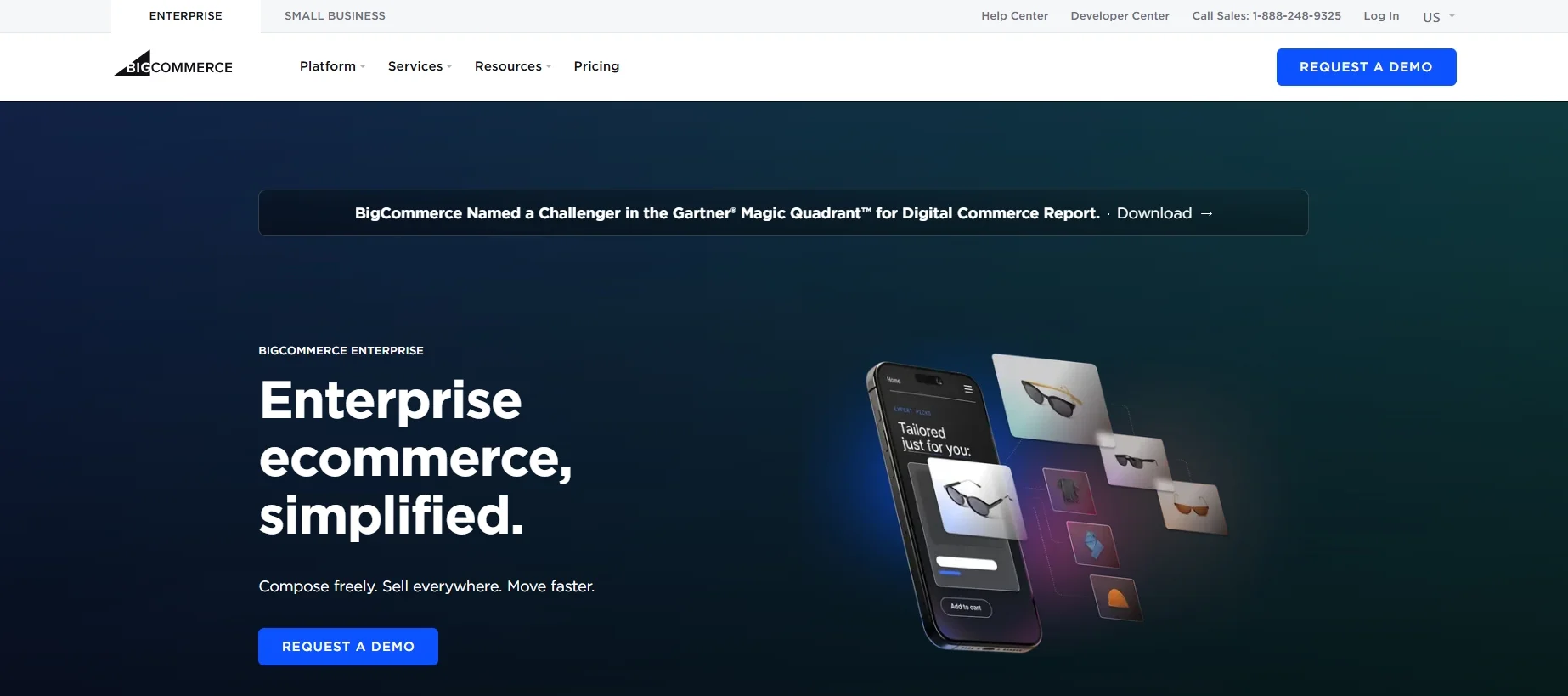
With a strong focus on scalability, BigCommerce Enterprise provides API-driven flexibility, multi-storefront capabilities, and native B2B tools, making it a great choice for wholesalers looking for a customizable and cost-effective solution.
Though BigCommerce is definitely a great solution to consider when choosing the best wholesale eCommerce platform, there are several disadvantages that you need to be aware of. Here's a breakdown of BigCommerce pros and cons for wholesalers.
BigCommerce Enterprise Pros | BigCommerce Enterprise Cons |
✓ Provides a dedicated suite of B2B features, including custom pricing, company accounts, and quote management for wholesale buyers. | – Requires advanced technical skill to perform extensive customization. |
✓ Sets custom pricing, discounts, and catalogs for different buyer groups based on their business needs. | – Has a steeper learning curve compared with other hosted eCommerce platforms. |
✓ Supports purchase orders, net payment terms, and digital wallets, catering to B2B payment preferences. | - Might depend on third-party apps for additional features, which can add up to your total cost of ownership. |
✓ Manages multiple B2B and B2C storefronts from a single BigCommerce dashboard using Multi-Storefront. | |
✓ Allows businesses to integrate ERP, CRM, and third-party tools seamlessly using open APIs. |
So, is BigCommerce Enterprise the best wholesale eCommerce platform? Yes, it will be the ideal solution if you are looking for a scalable, feature-rich, and cost-effective solution. Its built-in B2B tools, including custom pricing, bulk ordering, and flexible payment options, make it well-suited for businesses handling large transactions and multiple customer segments.
If you want to learn more about BigCommerce, please don't forget to take a look at our resources below:
#3 Adobe Commerce Cloud
User reviews: 4.3/5 on Capterra | 4.0/5 on G2
Adobe Commerce Cloud is another best wholesale eCommerce platform that we want to mention today. It is the fully managed, cloud-hosted version of Adobe Commerce (formerly Magento), designed for enterprise-level wholesalers that need a scalable, high-performance eCommerce solution. It combines the flexibility and customization of Adobe Commerce with the reliability of cloud infrastructure, eliminating the need for self-hosting, manual updates, and security management.
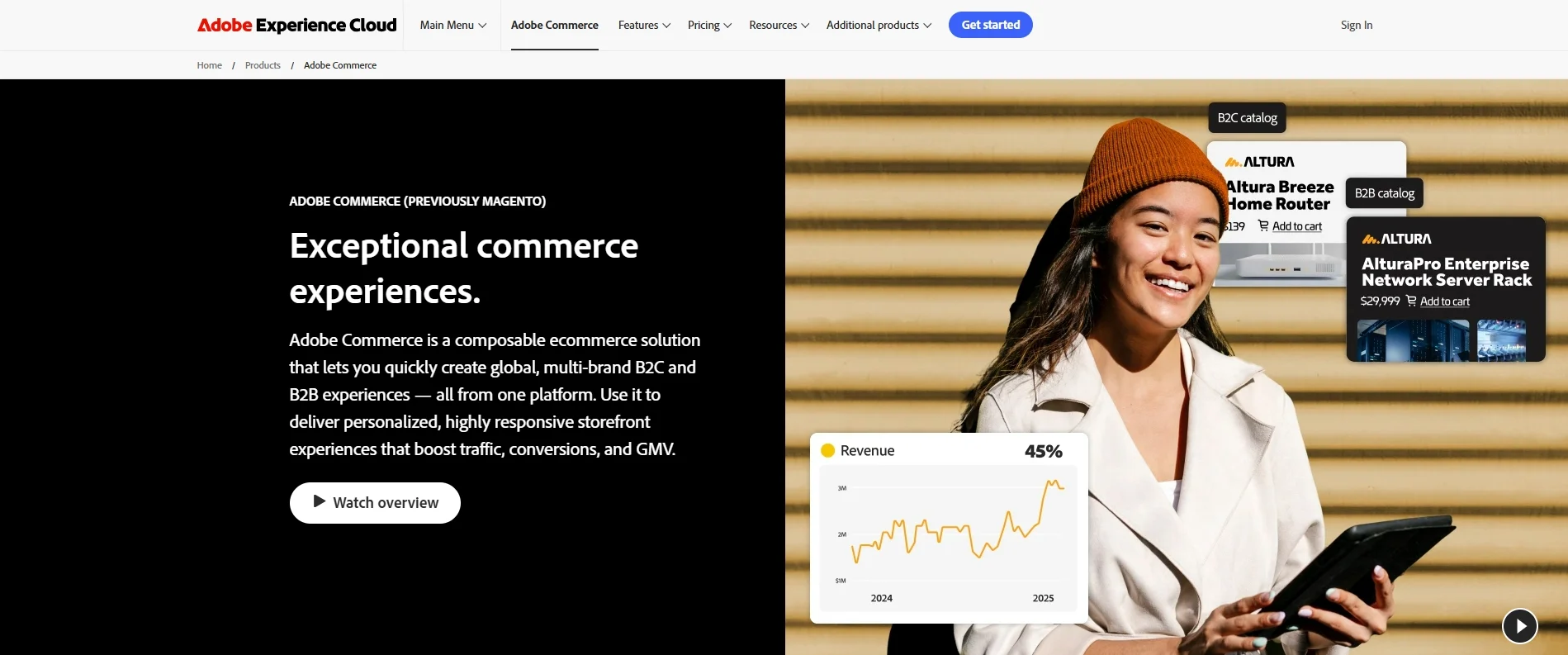
With its enterprise-grade security, automatic updates, and global scalability, Adobe Commerce Cloud is ideal for wholesalers handling complex catalogs, high-volume transactions, and multi-channel distribution. However, it is best suited for businesses with technical resources or development teams that can fully leverage its customization potential.
Adobe Commerce Cloud Pros | Adobe Commerce Cloud Cons |
✓ Supports bulk ordering, customer-specific pricing, and quote management for wholesalers. | – Requires developer expertise for advanced modifications and integrations. |
✓ Operates multiple B2B and B2C storefronts with a centralized admin panel. | – Might not be efficient if it isn't integrated with other Adobe products. |
– Is not beginner-friendly for smaller wholesalers due to high costs. | |
✓ Automates inventory tracking, warehouse management, and multi-location fulfillment. | |
✓ Supports headless commerce, API-driven integrations, and tailored storefront experiences. |
To conclude, Adobe Commerce Cloud is the best wholesale eCommerce platform for large wholesalers who need full customization, advanced B2B tools, and managed cloud hosting. It is well-suited for global businesses, multi-brand operations, and enterprises looking for deep Adobe integrations.
However, the high cost and complexity make it more appropriate for established wholesalers with dedicated development resources rather than small to mid-sized businesses looking for a simpler, out-of-the-box platform.
#4 WooCommerce
User reviews: 4.5/5 on Capterra | 4.4/5 on G2
Next on our list of the best eCommerce platform for wholesale today is WooCommerce – a flexible and highly customizable eCommerce platform built on WordPress. As an open-source platform, WooCommerce offers endless customization options, a vast plugin ecosystem, and cost-effective scalability, making it suitable for small to mid-sized wholesalers and businesses looking for a self-hosted solution.
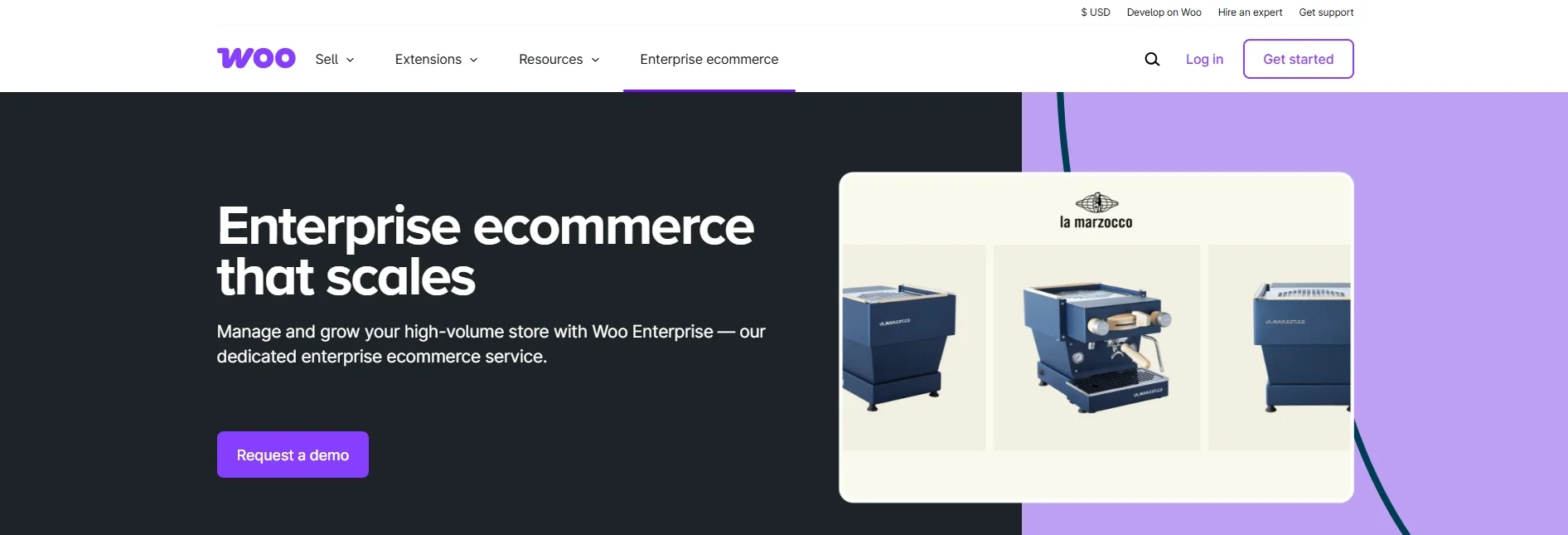
Unlike SaaS platforms like Shopify Plus or BigCommerce Enterprise, WooCommerce requires manual hosting, setup, and maintenance, but it provides unmatched freedom in in-store design, pricing strategies, and backend customization. With the right extensions, businesses can implement B2B-specific features, such as bulk ordering, tiered pricing, customer group segmentation, and purchase order management.
WooCommerce pros | WooCommerce cons |
✓ Offers complete control over pricing, checkout flows, and user experience with unlimited customization options. | – Must handle hosting, security, and updates manually. |
✓ Is free to install, making it affordable for small to mid-sized wholesalers. | – Heavily relies on hosting for an optimized store performance. |
✓ Supports plugins for tiered pricing, minimum order quantities (MOQ), and customer-specific pricing. | - Requires manual configurations and advanced technical expertise to set up a fully-functional store. |
✓ Provides powerful tools for organic traffic growth with the backing up of WordPress. | - Provides inadequate official support. |
✓ Offers a wide selection of third-party B2B and wholesale-specific plugins. |
We must say that WooCommerce is a great option for wholesalers who want full control over their online store without the high costs of SaaS solutions. It works best for businesses that have the technical resources to manage hosting, security, and plugin integrations. While it lacks native wholesale features, the right extensions can transform WooCommerce into the best wholesale eCommerce platform tailored to specific business needs.
For more expert insights into WooCommerce, feel free to take a look at our articles below:
- WooCommerce review: Is WooCommerce good for your business?
- 35 must-have WooCommerce plugins for eCommerce success
- WooCommerce tutorial: How to set up WooCommerce online store
#5 Oracle Commerce
User reviews: 3.8/5 on Capterra | 4.0/5 on G2
Now, let's talk about Oracle Commerce as the next best wholesale eCommerce platform that we want to mention today. It is an enterprise-grade solution designed for large-scale B2B and B2C businesses, including wholesalers who need a highly customizable and AI-driven solution. Built on Oracle’s cloud infrastructure, it offers robust tools for complex pricing structures, bulk ordering, multi-channel selling, and advanced customer segmentation.

The outstanding feature of Oracle Commerce is its ability to handle complex business models, making it ideal for wholesalers that deal with large catalogs, global operations, and customer-specific pricing models. The platform provides deep integration capabilities with ERP, CRM, and order management systems, ensuring smooth end-to-end operations.
Oracle Commerce pros | Oracle Commerce cons |
✓ Supports custom pricing tiers, customer segmentation, and contract-based pricing. | – Requires high cost of implementation, making it less accessible for small businesses. |
✓ Uses machine learning to recommend products, suggest bulk discounts, and optimize customer experience. | – Might require experienced developers and IT teams for deployment and customization. |
✓ Seamlessly connects with Oracle ERP, Oracle CRM, and Oracle Order Management for efficient operations. | |
✓ Operates on Oracle Cloud, ensuring enterprise-level security, fraud prevention, and compliance tools for global businesses. |
In short, Oracle Commerce is the best wholesale eCommerce platform for large wholesalers that need advanced pricing models, AI-driven personalization, and deep enterprise integrations. Its ability to support complex B2B transactions, contract-based pricing, and multi-channel selling makes it one of the most sophisticated wholesale eCommerce platforms available.
However, its high cost, complexity, and long deployment time mean it is best suited for large enterprises with dedicated IT teams that can fully leverage its customization and integration capabilities. Businesses already using Oracle’s ERP, CRM, or supply chain solutions will benefit the most from its seamless ecosystem.
#6 Virto Commerce
User reviews: 4.6/5 on Capterra | 4.7/5 on G2
Virto Commerce is a modular, API-driven wholesale eCommerce platform designed for mid-sized to large enterprises that require advanced B2B functionality, multi-channel selling, and flexible customization. Unlike traditional eCommerce platforms, Virto Commerce is built with a headless and composable architecture, meaning businesses can fully customize their eCommerce environment by integrating different services and third-party applications seamlessly.
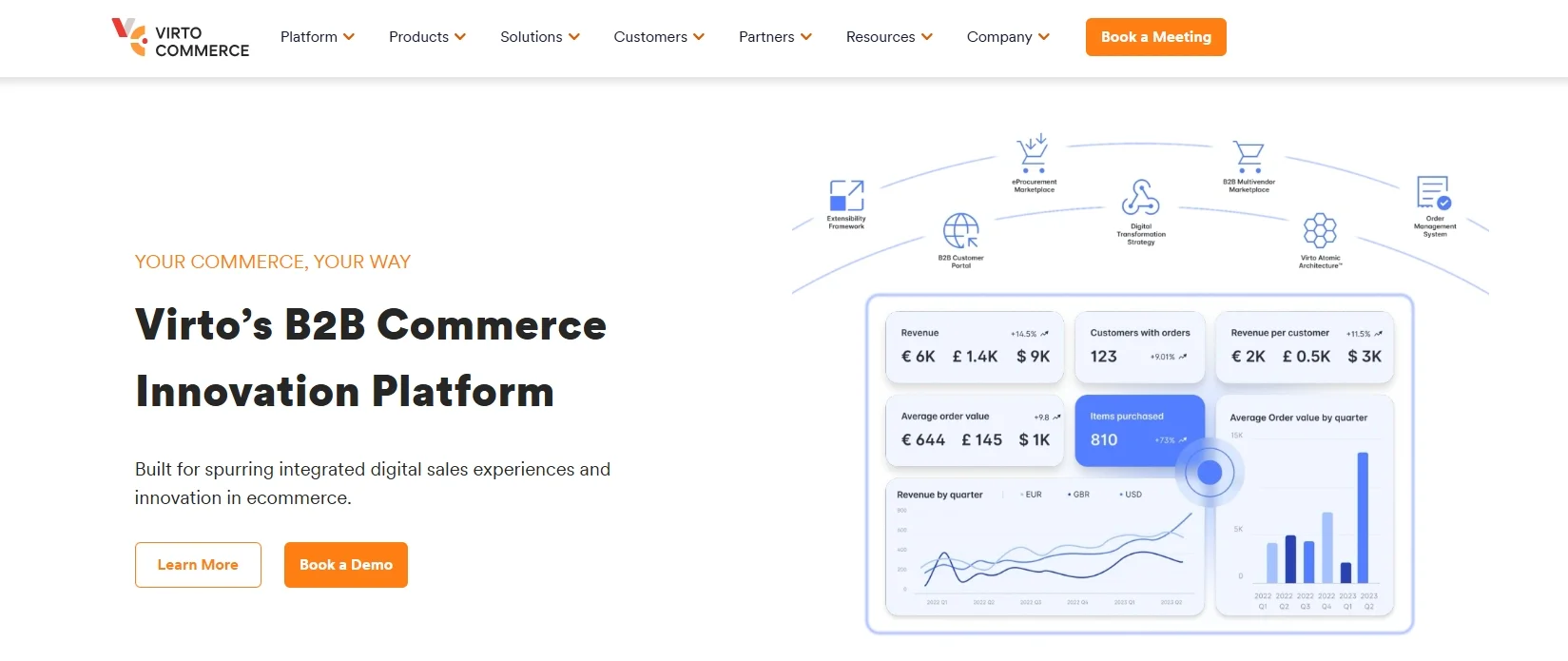
The most outstanding strength that makes Virto Commerce the best wholesale eCommerce platform lies in its flexibility and scalability. It allows wholesalers to build tailored B2B experiences with dynamic pricing models, advanced order management, and real-time inventory control across multiple warehouses. The platform is especially well-suited for businesses that require custom workflows, ERP/CRM integrations, and a multi-vendor marketplace model.
Virto Commerce pros | Virto Commerce cons |
✓ Supports contract-based pricing, volume discounts, and dynamic pricing rules for different buyers. | – Might require in-house IT or external developers to set up and launch your store. |
✓ Allows real-time inventory tracking, warehouse automation, and multi-location fulfillment. | – Heavily relies on custom development and configurations. |
✓ Easily integrates with ERP, CRM, PIM, and third-party applications for automated workflows. | |
✓ Offers flexible deployment options based on business needs. |
To conclude, Virto Commerce will be the best eCommerce platform for wholesale if you are looking for a highly customizable, API-driven eCommerce solution. Its modular architecture, advanced pricing models, and seamless ERP integrations make it well-suited for mid-sized to large enterprises that require complex B2B workflows and tailored digital commerce experiences.
However, Virto Commerce is not a plug-and-play solution. Businesses need a dedicated IT team or development resources to fully utilize their customization potential. It is best suited for wholesalers with long-term digital commerce goals rather than those looking for a quick and easy setup.
#7 OroCommerce
User reviews: 4.6/5 on Capterra | 4.3/5 on G2
Last but not least on our list of best wholesale eCommerce platform today is OroCommerce. This solution is designed specifically for wholesalers, manufacturers, and distributors who require advanced pricing models, customer segmentation, and deep ERP/CRM integrations. Unlike many general-purpose eCommerce platforms, OroCommerce was built from the ground up to meet the unique needs of B2B businesses, making it a notable wholesale eCommerce platform.
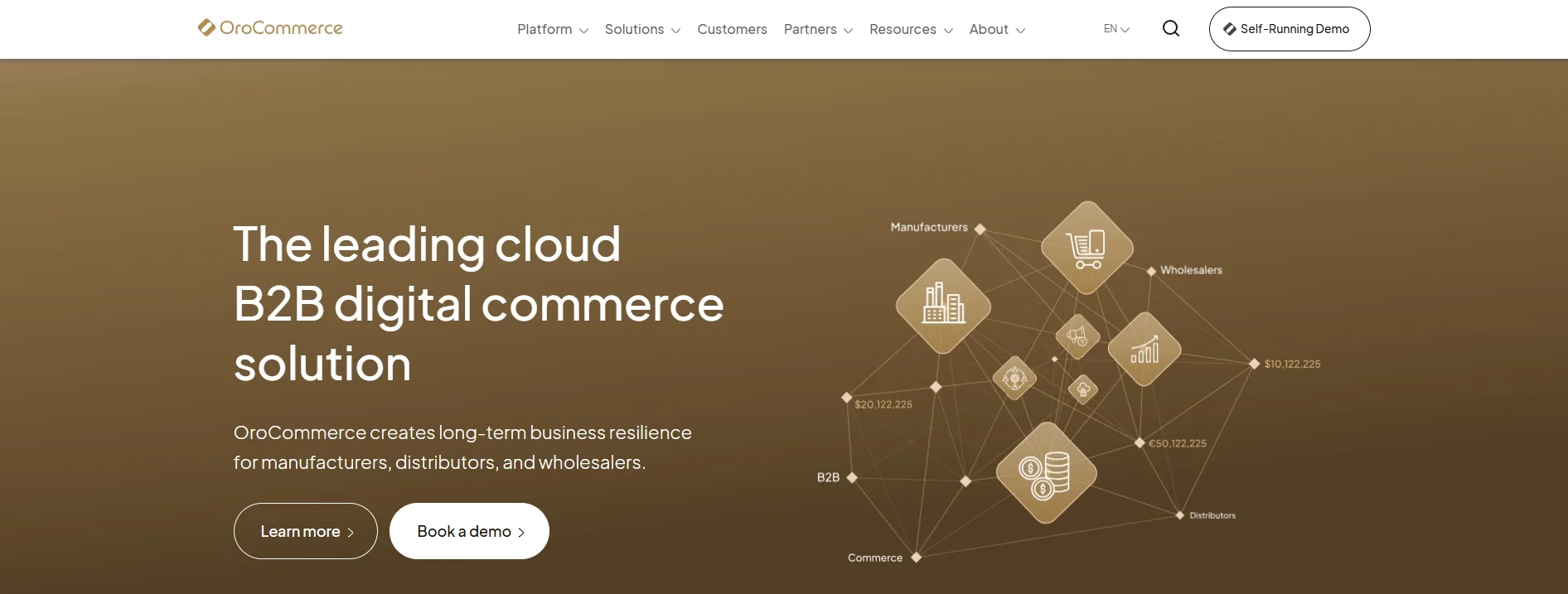
OroCommerce provides robust B2B marketplace capabilities, allowing businesses to sell wholesale directly, set up supplier networks, or manage multi-vendor operations from a single platform. The platform’s headless and API-driven architecture makes it highly adaptable, enabling deep customization and seamless integration with ERP, CRM, and inventory management systems.
OroCommerce pros | OroCommerce cons |
✓ Supports tiered pricing, contract-based pricing, bulk discounts, and quote approvals. | – Comes with a steep learning curve, requiring experienced developers and dedicated IT teams. |
✓ Supports multiple storefronts, vendor networks, and B2B marketplace models. | – Requires custom development, hosting, and ongoing maintenance, making it more expensive than SaaS alternatives. |
✓ Allows businesses to build custom eCommerce experiences and connect with ERP, CRM, and supply chain systems. | – Relies heavily on custom development rather than plug-and-play extensions. |
✓ Comes with OroCRM, enabling businesses to manage leads, customer relationships, and sales pipelines directly from the platform. |
In short, OroCommerce is the best wholesale eCommerce platform for those who need a highly customizable, enterprise-level eCommerce solution. Its built-in B2B features, strong automation capabilities, and integrated CRM make it well-suited for businesses that handle complex pricing structures, bulk orders, and multi-channel sales.
However, OroCommerce is not a beginner-friendly platform. It requires technical expertise, dedicated IT resources, and significant customization to maximize its potential. Businesses without in-house development teams or a large budget for eCommerce infrastructure may find SaaS-based wholesale solutions more suitable.
#8 WizCommerce
User reviews: 4.8/5 on G2
WizCommerce is a rising star among wholesale eCommerce platforms, designed to help B2B sales teams sell smarter, faster, and more collaboratively. While it may not be as widely known as some enterprise giants, WizCommerce stands out by offering a mobile-first, order-taking experience that directly connects sales reps with buyers, making it an ideal choice for businesses that rely on a field sales force.
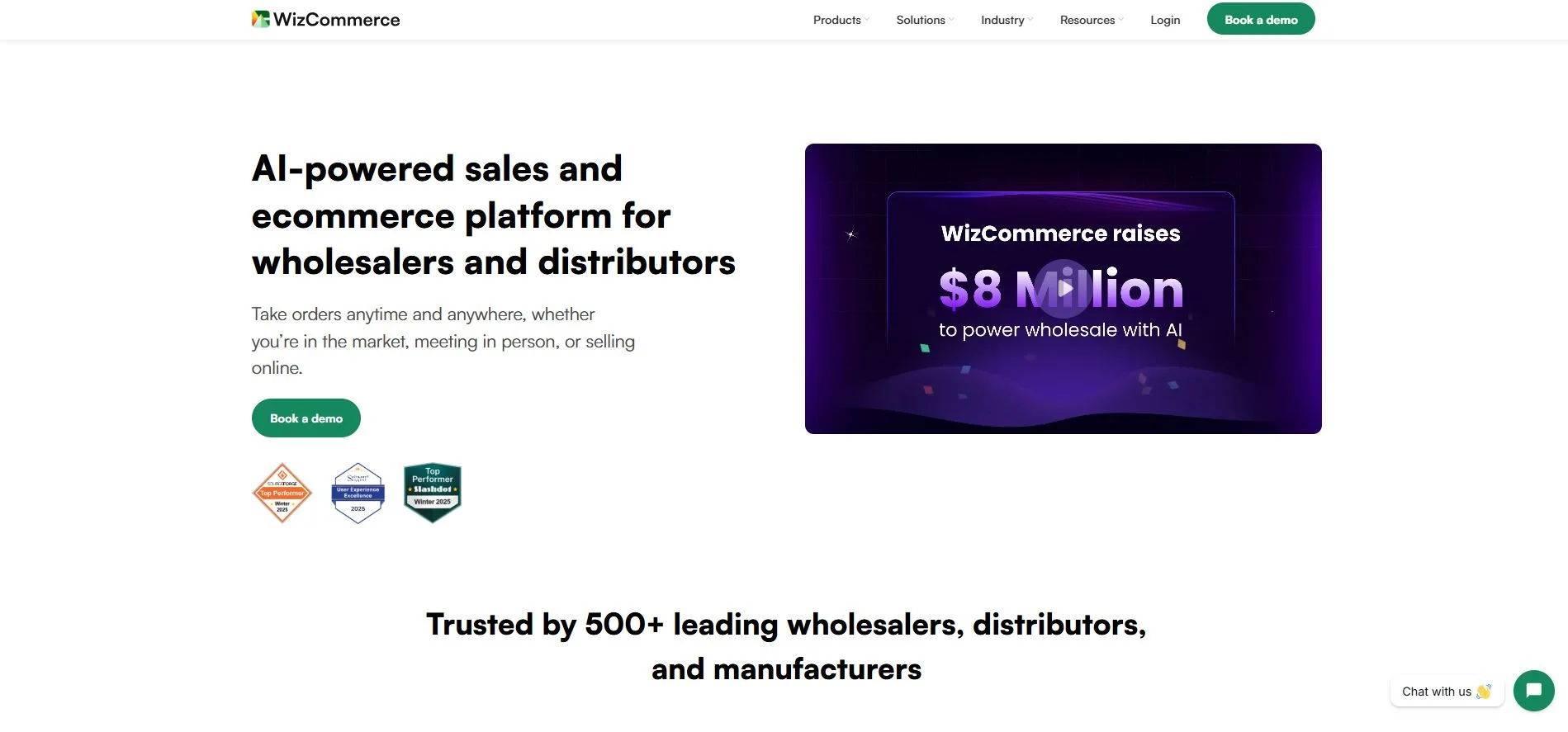
The platform focuses on streamlining the quoting and ordering process. Sales reps can generate quotes, place bulk orders, and manage accounts on the go through a dedicated mobile app, something that traditional B2B platforms often lack. WizCommerce also integrates seamlessly with popular ERP systems like SAP and NetSuite, ensuring that your product, inventory, and customer data stay consistent across your business.
Pros | Cons |
- Purpose‑built for wholesalers and B2B, with bulk ordering, custom pricing, and account‑based selling. - AI search, smart filters, and product recommendations make large catalogs easier to navigate and upsell. - Centralized order management, automated workflows, and real‑time inventory help cut manual work. - Integrates with popular ERPs and systems, enabling synced orders, invoices, and customer data. | - AI features can require good product data and initial setup to work effectively. - Implementing new workflows and training staff still takes time and internal change management. - Integration scope depends on your existing stack; custom or legacy systems may need extra integration work or services. |
In essence, WizCommerce is a smart wholesale eCommerce platform for manufacturers, distributors, and brands with active sales teams. That said, it might not be the best fit for businesses that require a storefront-first approach or need advanced marketplace features. It’s optimized more for order enablement and field sales than for running a full-fledged self-service B2B portal.
#9 BetterCommerce
User reviews: 4.8/5 on G2
BetterCommerce is a composable, API‑first commerce platform built for mid‑market and enterprise businesses that require flexibility across complex B2B operations. Rather than offering a monolithic system, BetterCommerce focuses on modular services that allow wholesalers and distributors to tailor their commerce stack based on specific business needs.
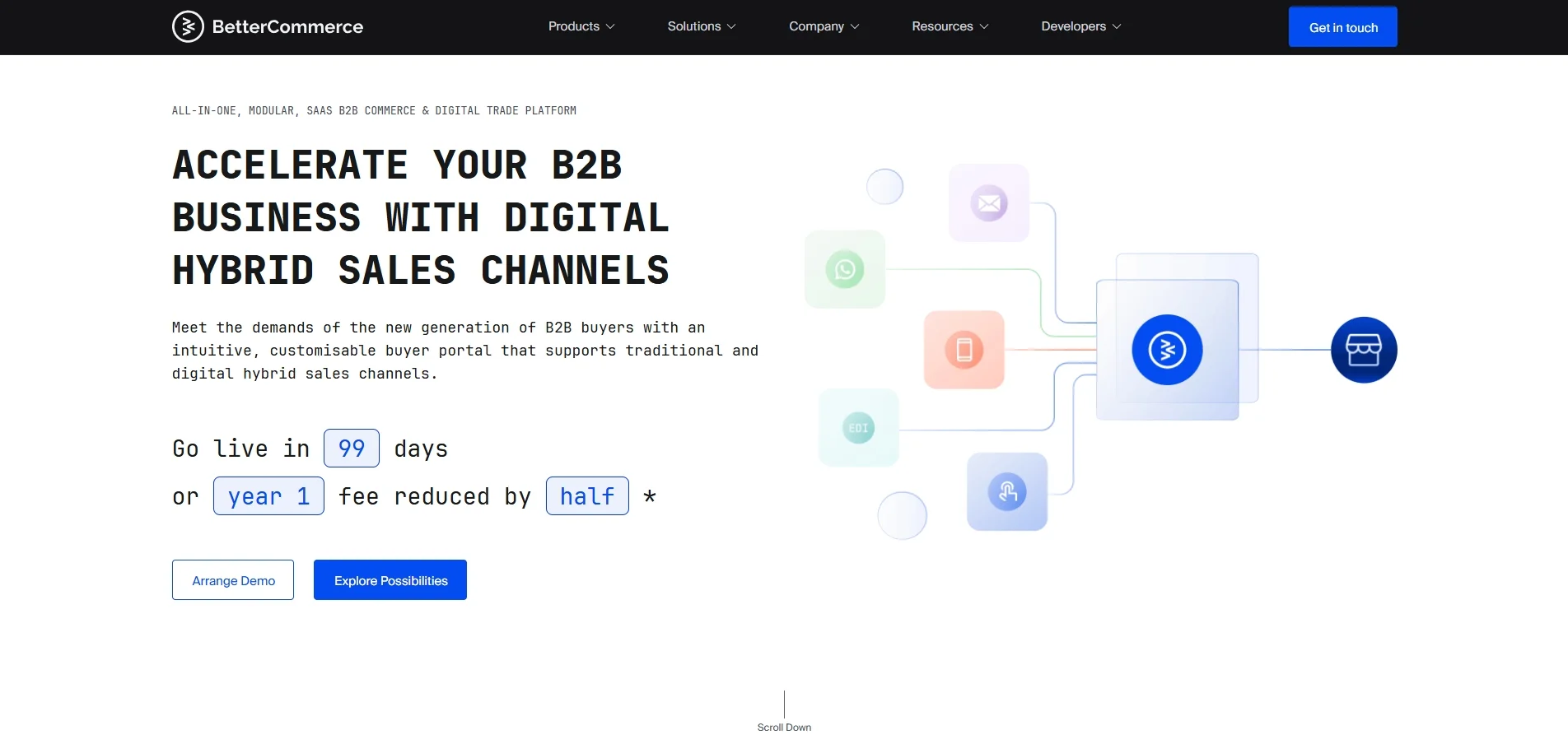
The platform supports advanced B2B capabilities such as customer‑specific pricing, contract‑based catalogs, and multi‑store management. Its headless architecture enables businesses to create custom buyer experiences across web, mobile, and other digital touchpoints, while still maintaining a single source of truth for products, pricing, and orders.
Pros | Cons |
- Headless and API‑first, very flexible and customizable. - AI capabilities for recommendations and personalization to improve customer experience. - Integrated PIM and OMS, automated order fulfillment, multi‑channel inventory sync, and visual merchandising tools. - Designed for scalability and high performance, suitable for growing mid‑market and enterprise brands. | - Requires more technical skills or development resources than simple site builders, not ideal for non-technical users. - May require expert setup to optimize your data and operations. - Smaller ecosystem and community than giants like Shopify; ewer “out‑of‑the‑box” themes, apps, and third‑party tutorials. |
Overall, BetterCommerce is the best wholesale eCommerce platform for businesses that value flexibility and long‑term scalability, suitable for companies with complex workflows, multiple brands, or region‑specific pricing strategies. However, it requires technical expertise to implement and maintain, and it may not be ideal for smaller teams that lack development resources or prefer a fully managed SaaS experience.
#10. Experlogix
User reviews: 4.6/5 on G2
Experlogix offers a powerful suite of commerce and configuration tools designed for businesses with highly complex product catalogs and sales processes. Known primarily for its CPQ (Configure, Price, Quote) capabilities, Experlogix Commerce is a solid choice for B2B companies that sell customizable products and require precision in pricing, quoting, and ordering.
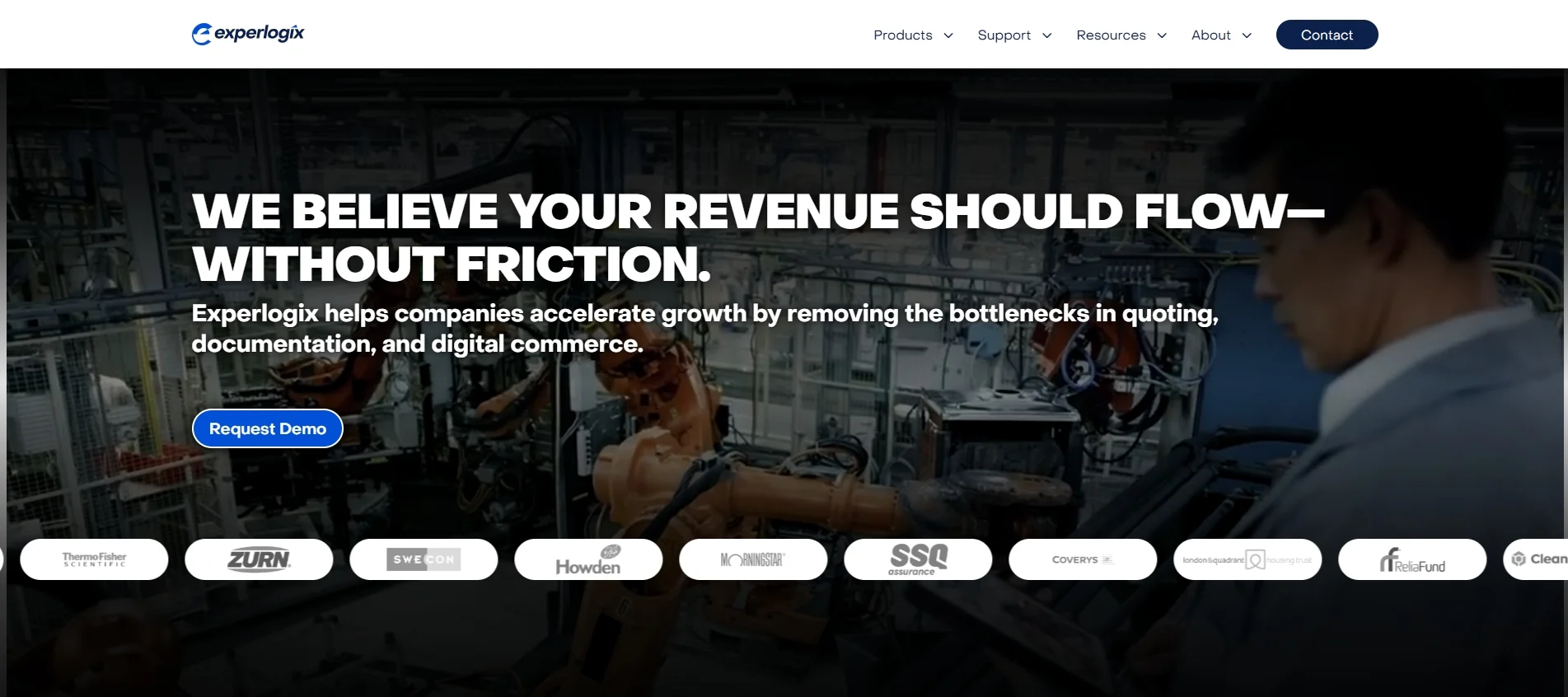
The platform is especially valuable for manufacturers, wholesalers, and distributors who need to manage large product variants, dynamic pricing rules, and customer-specific configurations. With built-in support for customer portals, quote-based workflows, and integrations with leading ERP and CRM systems, Experlogix ensures your sales process remains streamlined and accurate from configuration to checkout.
Pros | Cons |
- Built for B2B companies with account pricing, bulk ordering, and repeat orders. - Tight integrations with ERPs to sync orders, stock, and prices in real time. - Bulk product import by spreadsheet, category filters via spreadsheet. - Can greatly simplify back‑office flows and reduce admin when fully set up. | - Less suited to simple D2C brands that need rich marketing, content, and storefront design tools. - Database and ERP alignment can be complex. - Backend UX can feel less intuitive than WordPress/WooCommerce; limited drag‑and‑drop page building. |
In short, Experlogix is the best wholesale eCommerce solution for companies that deal with configurable products and want to empower both their sales reps and B2B buyers with a guided, error-free ordering experience. On the flip side, it may not be necessary for businesses with simpler catalogs or straightforward ordering processes.
How Does Wholesale eCommerce Work
Wholesale eCommerce often follows two primary distribution models, depending on the target buyers. Traditionally, wholesalers sell to retailers, who then resell products to consumers. However, with the rise of direct-to-consumer (DTC) eCommerce, some wholesalers now sell directly to consumers, bypassing retail intermediaries.
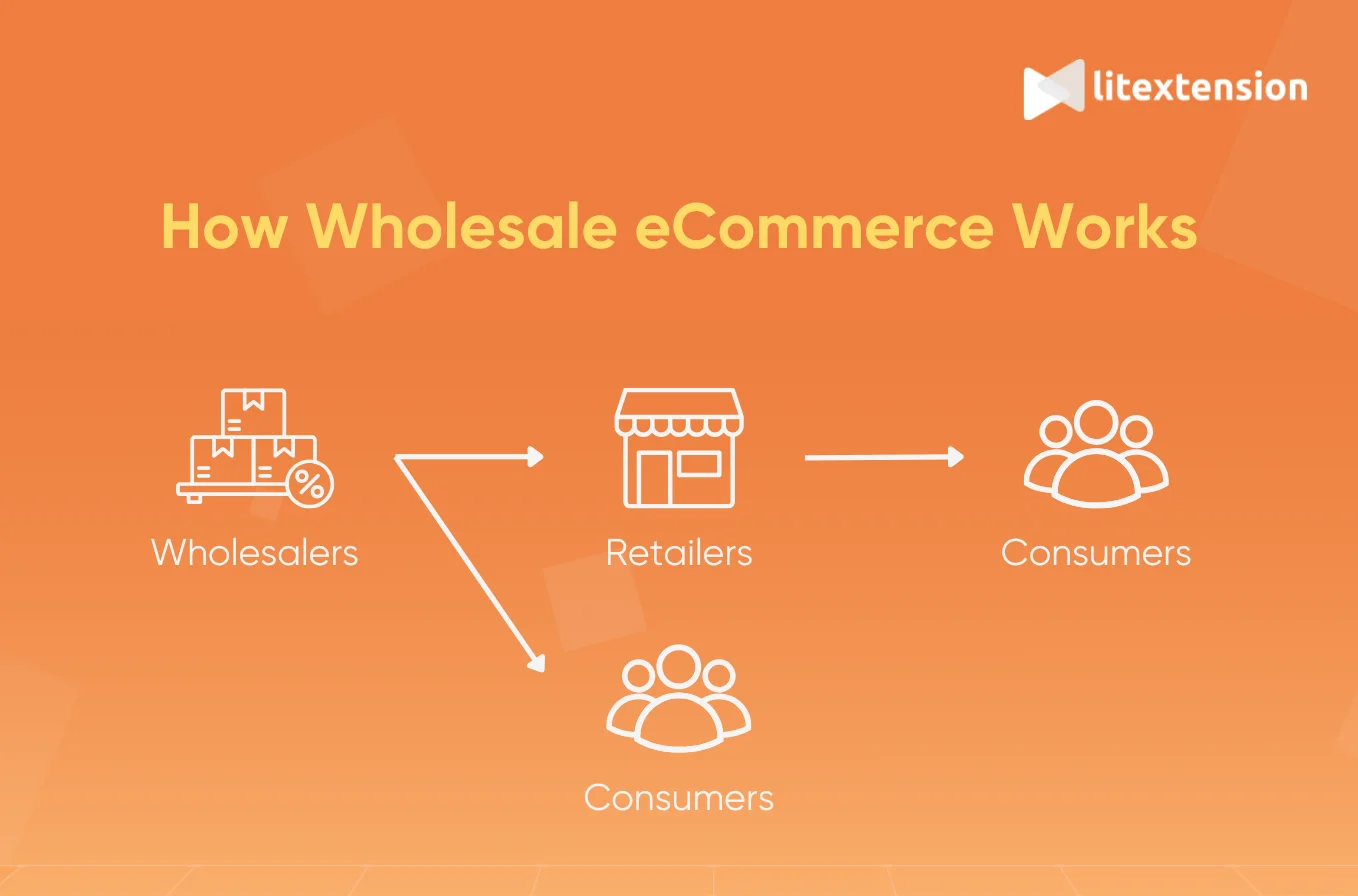
Path 1: Wholesalers → Retailers → Consumers
- Wholesalers source products from manufacturers or suppliers in large quantities.
- Retailers purchase bulk orders from wholesalers at discounted prices.
- Retailers resell products to consumers through physical stores or online platforms.
Path 2: Wholesalers → Consumers
- Wholesalers sell directly to consumers, bypassing retailers.
- Consumers purchase products in bulk, often at wholesale prices.
Understanding these two paths helps businesses decide which model best fits their strategy. Some wholesalers focus solely on B2B sales, while others offer bulk purchasing options for consumers. Both paths allow wholesalers to expand their reach, catering to business buyers and direct consumers based on their pricing and distribution strategy.
Benefits of the Best Wholesale eCommerce Platform
Choosing the best wholesale eCommerce platform can transform the way your business operates. In this section, let's explore the benefits that these platforms can bring.
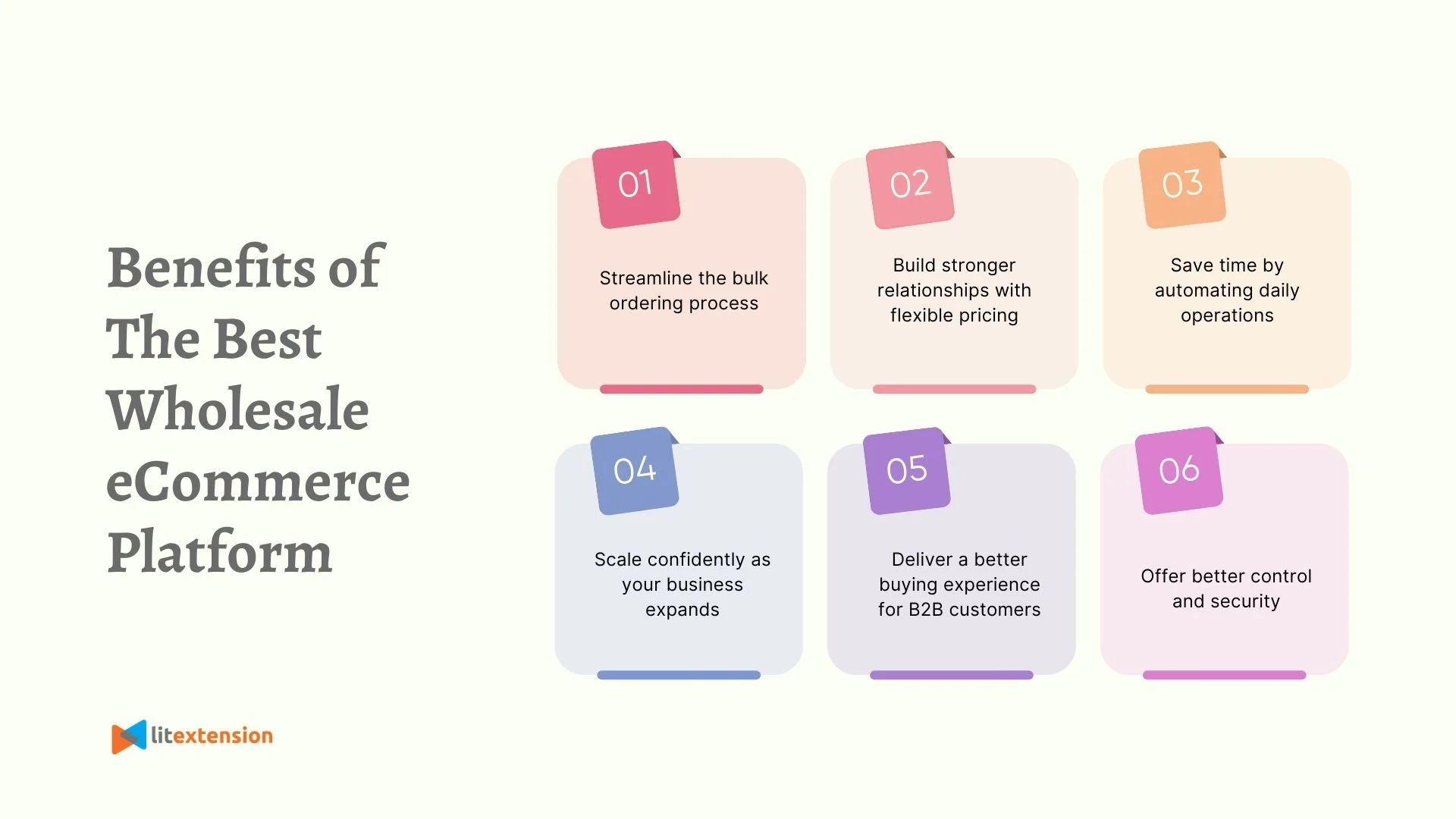
1. Streamline the bulk ordering process
Handling large purchase volumes is a core part of wholesale operations. A capable platform simplifies this by allowing customers to add multiple products in high quantities quickly. This reduces errors and speeds up the checkout process, making it easier for your team to fulfill orders efficiently.
2. Build stronger relationships with flexible pricing
B2B transactions often involve varied pricing based on customer type, order size, or negotiated deals. With the right tools, you can create tiered pricing, assign catalogs to customer groups, and offer exclusive discounts, all tailored to your client relationships.
3. Save time by automating daily operations
The best wholesale eCommerce platform can integrate with your existing systems to automate tasks like managing inventory, invoicing, and customer data, helping your team stay focused on growth and customer service instead of routine admin work.
4. Scale confidently as your business expands
As your operations grow, so do your technical requirements. A reliable system can handle increased product catalogs, more complex workflows, and higher order volumes without sacrificing performance, ensuring your business stays agile and competitive.
5. Deliver a better buying experience for B2B customers
The best wholesale eCommerce platform offers features like quick reorders, saved carts, and easy quote requests. Over time, these improvements help your buyers place orders faster and return more often.
6. Offer better control and security
Security is critical in wholesale, where sensitive data and high-value orders are involved. A modern solution includes user permissions, secure logins, and compliance features that protect your business and customer information from unauthorized access.
How to Choose the Best Wholesale eCommerce Platform
Selecting the right wholesale eCommerce platform is a critical decision that can impact your business’s efficiency, scalability, and profitability. With so many options available, it’s important to prioritize features that align with your business needs while considering factors like cost, integrations, and long-term growth potential.
Here’s what you should focus on when making your choice:
1. Balance cost and value
Rather than choosing the cheapest option, evaluate how well a platform meets your needs for the price. Some platforms offer fixed pricing with built-in features, while others provide more flexibility but require additional costs for development, hosting, or extensions. A lower upfront cost may seem appealing, but it’s important to consider long-term expenses and scalability.
2. Prioritize wholesale-specific features
A platform with built-in B2B capabilities will save time and reduce reliance on multiple integrations. Nonetheless, not all eCommerce platforms are designed for wholesale. As a result, you should look for one that offers:
- Custom pricing & tiered discounts that allow customer-specific pricing and bulk order discounts.
- Bulk ordering & quick reordering to simplify large purchases and repeat orders.
- Account management and permissions to enable different user roles for purchasing, approvals, and invoicing.
- Quote management to support RFQs (Request for Quotes) and negotiable pricing.
If these features aren’t available natively, assess whether third-party extensions can fill the gaps without adding unnecessary complexity.
3. Choose a platform that matches your technical skills
Ease of use and customization are often trade-offs. Some platforms are user-friendly and quick to set up, making them ideal for businesses that prefer a straightforward solution. Others offer greater flexibility and control but may require technical expertise for setup, customization, and maintenance.
Therefore, businesses should assess their internal resources to determine whether they need a plug-and-play solution or are prepared for ongoing development.
4. Ensure seamless integration with business systems
Wholesale businesses often rely on ERP, CRM, inventory management, and accounting software to handle large-scale transactions. A platform that integrates seamlessly with existing systems will prevent manual workarounds, reduce errors, and improve efficiency. Look for API-driven solutions that allow easy data exchange between different tools.
5. Plan for growth and scalability
A platform that meets today’s needs may not be sufficient as your business expands. Consider whether it supports multi-storefronts, international selling, automation, and advanced analytics. If expansion is a goal, ensure the platform can handle larger order volumes, multi-currency transactions, and localized pricing without requiring frequent migrations or upgrades.
6. Prioritize security and compliance
Handling wholesale transactions means managing large order values, sensitive customer data, and payment security. Choose a platform that offers PCI compliance, fraud protection tools, and data encryption to safeguard transactions. If selling internationally, ensure compliance with GDPR, tax regulations, and local data privacy laws.
Best Wholesale eCommerce Platform – FAQs
Which platform is best for wholesale business?
The best wholesale eCommerce platform depends on your business size, budget, and customization needs. Nonetheless, from our opinion, the best eCommerce platforms for wholesale include:
#1 Shopify Plus
#2 BigCommerce Enterprise
#3 Adobe Commerce Cloud
#4 WooCommerce
#5 Oracle Commerce
#6 Virto Commerce
#7 OroCommerce
Is Shopify good for wholesalers?
Yes, Shopify is a solid choice for wholesalers, especially for businesses that already sell B2C and want to add a wholesale channel. Shopify Plus offers B2B features like custom pricing, bulk ordering, and automated workflows.
Is dropshipping or wholesale better?
It depends on your business model. Dropshipping is ideal for low-risk, low-investment businesses since you don’t need to manage inventory. However, it comes with lower profit margins and less control over fulfillment.
Wholesale, on the other hand, allows you to buy in bulk at lower costs, set higher profit margins, and provide better customer service. While wholesale requires inventory management and upfront investment, it offers more stability and brand control in the long run.
Do you need a wholesale license to start selling?
In most regions, a wholesale license is required to buy and sell products in bulk legally. This license allows wholesalers to purchase goods tax-free from manufacturers or distributors and resell them to retailers or consumers.
Licensing requirements vary by country and state, so it’s important to check local regulations before starting your wholesale business. Some platforms and suppliers may also require proof of a wholesale license or reseller certificate before granting access to wholesale pricing.
Final Words
That brings us to the end of our article on the best wholesale eCommerce platforms. In conclusion, choosing the best wholesale eCommerce platform depends on your business size, operational needs, and the level of customization required. Ultimately, the right platform should align with your business goals and support long-term growth. Whether you're launching a new wholesale store or upgrading an existing system, investing in a platform that can handle your current and future needs will ensure success in the competitive wholesale eCommerce market.
If you like this blog, please don't hesitate to check out other articles on eCommerce platforms on our website for more expert tips and insights.
